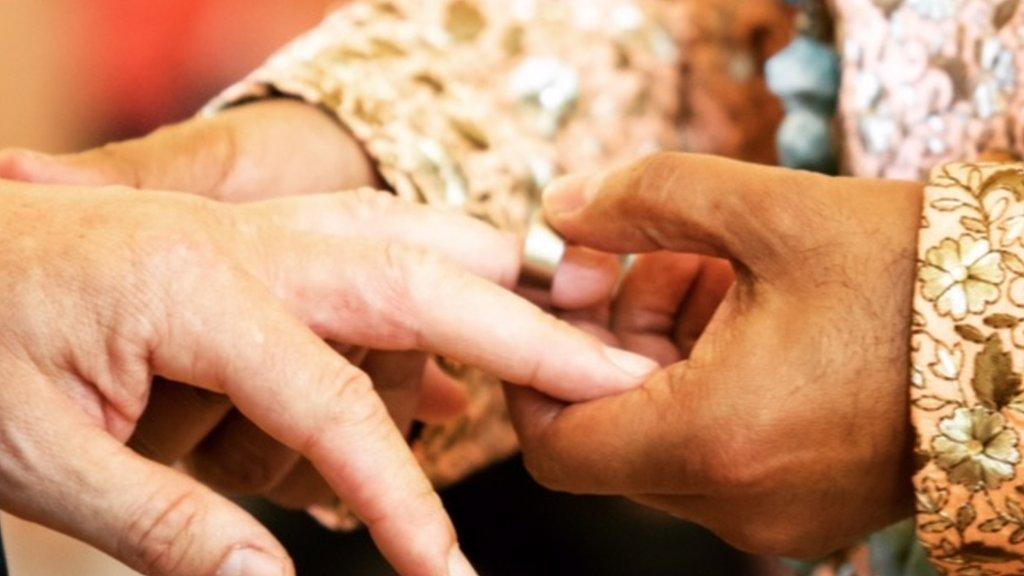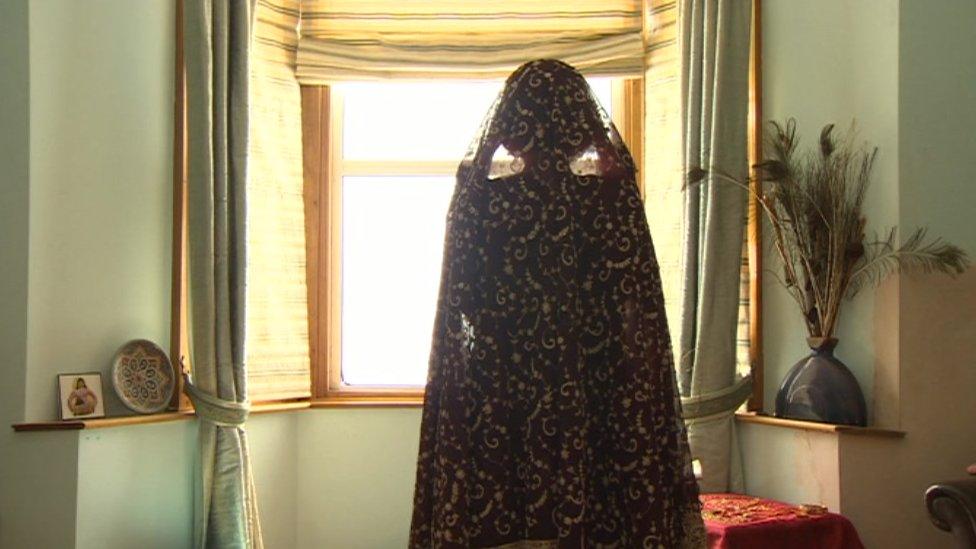'Rejected by my family, raped - but proud to be gay'
- Published

Many LGBT Asians face abuse from their own families
Seyeda has been rejected by her family, abused and raped because she is gay - but is determined to be out and proud.
The 42-year-old from Pakistan believes she would have been killed if she had not moved to the UK.
"I can't even imagine (what would have happened). I don't think I would be alive there.
"But there is no looking back. If people are harassing me, I need to make myself more strong."
Seyeda - whose parents died before they discovered her sexuality - was under pressure from an early age to marry a cousin.
"I didn't want to because I knew of my orientation," she told BBC Radio 5 Live Investigates.
A new report from LGBT domestic abuse charity Galop reveals around one in four of the cases seen by their advocacy service has been abused by family members - while one in ten is at risk of 'honour-based' violence or forced marriage.
'Bad time'
University provided no escape for Seyeda. After a supervisor discovered her sexuality, she says she was forced off her PhD programme, and left without accommodation.
"I didn't have anywhere to stay," she explained. "If you are a woman on your own in Pakistan, you can't live anywhere.
"I have uncles and aunts in Pakistan, and I was begging to stay (with them). But they weren't ready to (let me) - and I was not ready to get married in the way they wanted me to.
"Once the extended family came to know about my sexuality, I had a bad time."
She describes being pushed down the stairs by a male relative, her teeth knocked out. Eventually she was thrown out of the family home.
She ended up staying with friends, and meeting a girlfriend - whose husband, Seyeda said, raped both her and her friend when he discovered their relationship.
"That was the most horrible night of my life," she said. "I struggled a lot after that."

LGBT domestic abuse charity Galop says more specialised services are needed for survivors
Seyeda escaped by coming to the UK as a student in 2010.
Yet despite what she calls the "protection of law and order" in the UK, she has been the victim of an attempted rape here - and says she receives threatening emails and messages from anonymous numbers.
But she is determined to campaign for greater freedoms for people like her. She attends Pride events, and has spoken publicly about her experiences.
She is shocked by how many British-born Asians insist on hiding their sexuality - and that forced marriage in the Asian LGBT community is common.
"I was astonished that people don't come out or inform their families, even though they have the protection of the law. And that is the problem. They come to LGBT gatherings - and they just hide their faces.
'Ruining lives'
"They don't want to tell their families what they are. And this is making them more sick and confused.
"There are many gays here who get married just because of their families. But they are ruining other peoples' lives."
Matt Ogston-Mahmood has devastating first-hand experience of the impact of conservative religious attitudes to homosexuality.
His fiancé, Naz Mahmood, took his own life two days after being confronted about his sexuality by his conservative Muslim parents.
Now Matt campaigns against what he calls 'religious homophobia' - and is calling for it to become an officially recorded hate crime.
"My inbox is full of messages from gay men and women who say their conservative religious parents would rather they were dead than for them to be accepted in their family," he told BBC Radio 5 Live Investigates.

The Naz & Matt Foundation campaigns for the LGBT community to be free from religious intolerance
Deputy Chief Constable Louisa Rolfe of the National Police Chiefs' Council (NPCC) said officers are "really keen" to understand the threat of forced marriage or 'honour-based' abuse within the LGBT community.
"These cases are so sensitive and we work really hard to ensure that victims can trust the officers that they work with," she added.
Gay and lesbian people from ethnic minorities can be more vulnerable to abuse in relationships, as well as from their families, said Professor Rusi Jaspal of Leicester De Montfort University.
"People who are abused as children may come to accept further instances of abuse in adulthood - either because they have come to believe they deserve it, or because it has become normalised in their minds," he explained.
Changing attitudes
The Home Office, in a statement, said the Government is committed to transforming the response to domestic abuse. It added: "No one, regardless of age, gender or sexuality deserves to endure any type of abuse, especially from those closest to them."
Meanwhile, Seyeda said she believes LGBT people from culturally conservative backgrounds have a duty to change attitudes.
"It is necessary. If you hide yourself - who will accept you as you are?"
BBC Radio 5 Live Investigates is on from 11:00 on Sunday December 2 on BBC Radio 5 Live.
- Published19 July 2017

- Published20 December 2014

- Published8 November 2017

- Published14 November 2014
